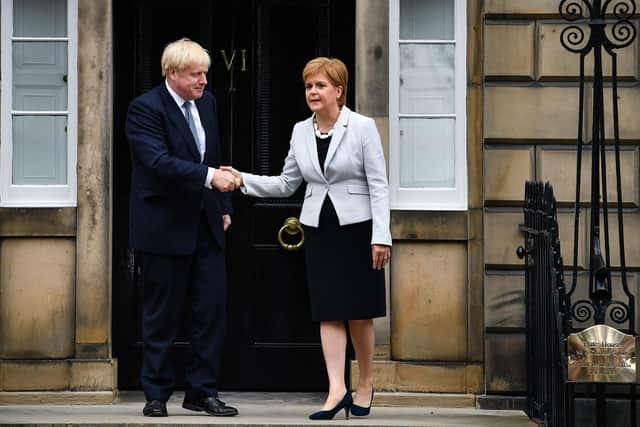Cost of living crisis: Nicola Sturgeon and next Prime Minister must unite to wage war on poverty – Susan Dalgety
Figures released by the Scottish Government earlier this week reveal a depressing picture of Scotland in 2022. Nearly a quarter of children are living in poverty, but that rises to 55 per cent of children whose mother is under 25.
Stop and think about that for a moment. More than half of Scottish children whose mother is under 25 are living in poverty, their chances of a fulfilling life reduced before they even start primary school.
Advertisement
Hide AdAdvertisement
Hide AdMore figures spilled out. In the Registrar General’s Review of Scotland’s Population 2021, Julie Ramsay, head of vital events, revealed that mortality rates are “about two times as high in the most deprived areas compared to the least deprived areas”.
She goes on: “But for some specific causes of death, we see much larger inequalities. For example, people in the most deprived areas of Scotland are more than 15 times as likely to die of drug misuse than those in the least deprived areas.” And she adds: “In recent years life expectancy improvements have stalled and started to reverse.”
Strip her sentences of the statistical language and what she was telling us is that Scots living in poverty are much more likely to die sooner than their better-off neighbours.
It doesn’t matter what the cause, street drugs, booze, malnourishment, hopelessness, one of Scotland’s senior civil servants has just told us – in no uncertain terms – that being poor kills people, and she has the evidence to prove it.
And if that wasn’t a bleak enough picture of modern Scotland, things are about to get a whole lot worse.


We have all read the warnings about energy prices going up by 80 per cent from October 1, but I am not quite sure the reality of what this will mean for most Scots has truly sunk in yet.
I had to read a report about the Shetland Islands three times this week before I grasped its import for the 23,000 people living there. Council leader Emma Macdonald told the BBC that research by the council shows that households face energy bills of £10,000 year, pushing 96 per cent of the population into poverty.
And my stomach churned when I read the Resolution Foundation's warning that Britain faces the biggest squeeze in living standards for a century, a timeline that includes the depression of the 1920s and 30s.
Advertisement
Hide AdAdvertisement
Hide AdThe think tank said that people will see a ten per cent fall in disposable income this year and next – around £3,000 for a typical household and it predicted that three million extra people across the UK could fall into absolute poverty.
“No responsible government could accept such an outlook, so radical policy action is required to address it,” said Lalitha Try, a researcher at the foundation, adding that Britain needs a “longer-term outlook, which can only be achieved by a new economic strategy that delivers higher productivity and strong growth”.
And therein lies the problem. Britain does need a plan for the future. A strategy that will bring down inflation, fix the broken energy market, invest in education and the National Health Service, and support business to grow a sustainable economy, one built on stronger foundations than the City of London.
Even more urgently, we need immediate action to stop energy bills spiralling out of control and to protect households from the worst effects of rampant inflation.
But that plan needs every part of government in the UK to work together, from the new Prime Minister to the mayors of England’s big city regions and, of course, the First Minsters of Scotland and Wales, and whoever is in charge of Northern Ireland.
Barring a miracle, Liz Truss will be Prime Minister in a few day’s time. She can choose to indulge the SNP government by engaging in their phoney war on the constitution, or she can show real leadership by inviting Nicola Sturgeon and the other devolved leaders to help her tackle the cost-of-living crisis that is going to engulf us all, and which many will not survive.
I don’t mean she should set up a pointless two-hour summit round the Cabinet table, which would be nothing more than a gratuitous photo opportunity. Sturgeon for one would take great delight in turning down that invitation.
Truss should convene a high-level conference, lasting as long as it takes, to hammer out practical actions that will help every household in the United Kingdom survive the winter and to lay the foundations for a more secure future in every corner of our country.
Advertisement
Hide AdAdvertisement
Hide AdIt doesn’t matter that Truss and Sturgeon don’t like each other. It doesn’t matter that Sturgeon would use such a conference to push her separatist agenda, or that the mayor of Greater Manchester, Andy Burnham, would use the national stage to (gently) promote his Labour leadership ambitions.
Nor does it matter that it was the Tories’ austerity policies that made the current situation so much worse for many households. All that matters now is that we are a country in crisis.
At a time of war, we expect our politicians to work together to defeat the enemy and to save as many lives as possible. We are at war now, against the prospect of hyperinflation, of people dying of despair, of a generation of children whose lives will be stunted before they can even walk.
We need our political leaders to ditch the pointless posturing to their own party supporters and put the people first.
Truss could start by picking up the phone to Bute House on Tuesday after her audience with the Queen, and inviting Sturgeon to Number 10. And if the First Minister really loves Scotland, and its people, she would be on the first train south.
Comments
Want to join the conversation? Please or to comment on this article.
